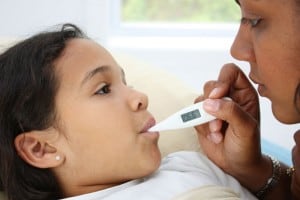How To Reduce A Fever And Maintain Normal Baby Temperature Safely
Fever is the most common reason for parents to bring their children to my office. Sure, I see plenty of kids each day for routine well-child check ups, but regardless of the time of year, the sick visits outnumber the healthy ones. My practice is young, with most of the patients younger than 3 years of age. These toddlers are in the thick of the petri-dish-years, as they start in daycare and school, and put everything in their mouths. I predictably spend half my day weeding through colds, flus and ear infections and discuss fever management routinely. In the emergency room I suspect 75% of my time is spent with children suffering with fever.
Fever makes kids look awful; they are lethargic, panting, hearts racing, incoherent. It looks dreadful.
Parents are scared of fevers. They are obsessed with maintaining normal baby temperature. Fever makes kids look awful; they are lethargic, panting, hearts racing, incoherent. It looks dreadful. Many parents are fearful of febrile seizures, and though evidence shows we cannot prevent these episodes with medication, we all try. Fevers usually don’t indicate anything serious. They typically present as a sign of a viral illness. Classic viral infection symptoms include runny nose, cough and congestion. The actual temperature is not a good indicator of the type of infection; a viral infection can cause a 40-degree fever and a bacterial one can cause a 38-degree fever. Of course, if you are concerned, or your child looks unwell, please see your doctor. That’s what we are here for.
Current evidence demonstrates that the most efficacious dose for acetaminophen is 15mg/kg of body weight, and ibuprofen 10mg/kg.
 How to reduce a fever
How to reduce a fever
Antipyretics, or fever reducing medicines are big business. Pharmacies sell many different versions, with bright colored boxes appealing to children and adults alike. I am thankful there are so many options, but one huge problem remains: the dosing. A new commentary by Tamur and Gosselin advocates for standard dosing of these medications, and I couldn’t agree more. Current evidence demonstrates that the most efficacious dose for acetaminophen is 15mg/kg of body weight, and ibuprofen 10mg/kg. It makes logical sense to have a weight-based dosing methods and established delivery devices in each and every package of anti-fever medicine. A single concentration of liquid acetaminophen and ibuprofen may enable parents to choose the appropriate, therapeutic amount of medicine while minimizing the risk of overdosing. Pretty simple if you ask me.
If you look at a bottle of your favorite fever medicine, whether acetaminophen or ibuprofen (NEVER give your child ASA or Aspirin), you will find one of several dosing measurements. Your acetaminophen (Tylenol or Tempra) may contain 80mg of medicine per 1ml liquid or 100mg per 5 ml. That is a big difference. Similarly, your ibuprofen product (Advil or Motrin) may have 100mg of medicine in 5ml of suspension or 200mg in 5 ml. That is twice as much medicine in the same volume! What’s more, parents often chose to use non-standard measuring devices like a household spoon to dose the medicine. This only increases the inaccuracy and risk of under and over dosing.
More than 50% of parents provide the wrong dose to their children, with at least 35% of parents giving a sub-theraputic dose of medicine, and 15% give supra-therapeutic amounts of acetaminophen.
A common reason why physicians see kids in the hospital and office is under dosing of the anti-fever medicine and resulting persistent fever.
 More than 50% of parents provide the wrong dose to their children, with at least 35% of parents giving a sub-theraputic dose of medicine, and 15% give supra-therapeutic amounts of acetaminophen. Toxicity of acetaminophen can cause irreversible liver damage. We as parents must know what we are giving our kids. This is why the recent commentary by Tamur and Gosselin should encourage a more standardized way of delivering anti-fever medications for our children with appropriate, easy to follow instructions on the box.
More than 50% of parents provide the wrong dose to their children, with at least 35% of parents giving a sub-theraputic dose of medicine, and 15% give supra-therapeutic amounts of acetaminophen. Toxicity of acetaminophen can cause irreversible liver damage. We as parents must know what we are giving our kids. This is why the recent commentary by Tamur and Gosselin should encourage a more standardized way of delivering anti-fever medications for our children with appropriate, easy to follow instructions on the box.
Until this time, please exercise caution when you dose your child with fever-reducing medicine. The dosing may be different on your current medicine bottle from the last bottle you used. Read the label. Identify the dosing and do some simple cross multiplication to identify the correct dose. Use the provided measuring cup or syringe, or ask your pharmacist if they have an extra one. When in doubt about how to properly dose your child, ask your pharmacist or doctor. In my own practice, I write it out for my patients several times a day; it is worth it to keep the fever down and keep your child healthy.
This article can be found here.
Quick Tips:
-
Ensure proper dosing
-
Use a measuring syringe, not a spoon
-
See your doctor if your child is ill
-
Fever in a child < 2months? See your doc ASAP
What is the best medicine for sore throat?
What can swollen throat glands mean?
Stye in eye? What is that from?
Dina is a wife, mother of 4, and adrenaline junky. She loves to share children’s health information from her professional and personal experience. More About Dr Dina.











